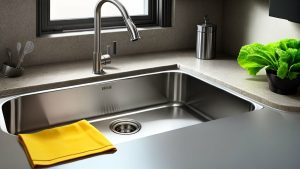Keeping your kitchen sink clean and sparkling is essential for maintaining hygiene and aesthetic appeal in your kitchen. However, achieving a pristine sink requires more than just a quick wipe down. In this ultimate guide, we’ll provide a step-by-step process to deep clean your sink, offer maintenance tips, share DIY natural cleaners, and address common challenges you may encounter.
Key Takeaways:
- A clean and sparkling kitchen sink is crucial for hygiene and aesthetics.
- Deep cleaning your kitchen sink requires essential materials such as non-abrasive cleaners, scrub brushes, gloves, and microfiber cloths.
- Maintaining a clean sink on a day-to-day basis involves regular wiping, avoiding harsh chemicals, and preventing buildup.
- Different types of sink materials require specific cleaning techniques to prevent damage and ensure optimal results.
- Expert recommendations for high-quality sink cleaning products can save you time and effort.
Importance of a Clean and Sparkling Kitchen Sink
Your kitchen sink may be one of the most frequently used areas in your home, which is why it’s crucial to keep it clean and sparkling. Not only does a clean sink promote good hygiene practices, but it also enhances the overall aesthetics of your kitchen, making it a more enjoyable space to work in.
Furthermore, a dirty sink can lead to unpleasant odors and even clogging issues, especially if left unattended for a prolonged period. By regularly cleaning your sink, you can prevent these problems and ensure that your kitchen remains a healthy and sanitary space.
Materials Needed for Cleaning Your Sink
To effectively clean your kitchen sink, you will need a few basic materials:
| Material | Purpose |
|---|---|
| Non-abrasive cleaner | Removes stains, grime, and dirt without scratching the sink surface. |
| Scrub brush | Helps to remove tough stains and grime from the sink surface and around the drain. |
| Gloves | Protect your hands from harsh chemicals and hot water. |
| Microfiber cloths | Polish the sink surface and dry it without leaving lint or streaks. |
When selecting cleaners, avoid using harsh chemicals or abrasive materials that can damage the sink surface. Choose a cleaner that is specifically designed for your sink material, whether it’s stainless steel, porcelain, or composite.
Additional Cleaning Materials
If you have hard water stains or mineral buildup in your sink, you may also need:
- Vinegar
- Baking soda
- Lemon juice
These natural ingredients can help dissolve tough stains and remove buildup without damaging the sink surface.
Step-by-Step Guide to Deep Clean Your Kitchen Sink
Deep cleaning the kitchen sink can be a daunting task, but with the right techniques and materials, it can be done quickly and effectively. Follow these steps to give your sink a deep clean:
- Remove any debris from the sink, including food particles, utensils, and other items. Dispose of them properly.
- Rinse the sink with hot water to remove any loose dirt or grime.
- Apply your chosen non-abrasive cleaner to the sink, making sure to cover all surfaces evenly.
- Scrub the sink using a soft-bristled brush or sponge, paying extra attention to stained or discolored areas. Use circular or back-and-forth motions, depending on the shape of your sink.
- Rinse the sink thoroughly with hot water, making sure to remove all traces of the cleaning solution. Use a clean cloth to wipe down the sink and remove any excess water.
- Disinfect the sink by applying a disinfectant solution or a mixture of water and vinegar. Let it sit for a few minutes before rinsing with hot water.
- For extra shine, buff the sink with a microfiber cloth or a paper towel. This will remove any water spots and leave your sink sparkling.
These sink cleaning hacks can help you achieve a deep clean without too much effort. For instance, use baking soda and vinegar to remove tough stains, or sprinkle salt over a lemon wedge to clean and deodorize your sink. Remember to wear gloves to protect your skin, and avoid using abrasive scrubbers that can damage the sink’s surface.
Maintenance Tips for a Shiny and Clean Sink
Maintaining the cleanliness and shine of your kitchen sink does not have to be a daunting task. With a few simple steps, you can keep your sink looking its best. Follow these kitchen sink maintenance tips to keep your sink shiny and clean:
- Regular Wiping: Wipe your sink clean after each use to prevent the buildup of dirt and stains. Use a soft sponge or cloth with non-abrasive cleaner to wipe away any residue.
- Avoid Harsh Chemicals: Avoid using harsh chemicals on your sink as they can damage the surface. Instead, use mild cleaners or natural products like vinegar and baking soda to keep your sink looking clean and shiny.
- Prevent Buildup: Avoid leaving food scraps or other debris in your sink for an extended period. This can cause buildup and lead to clogged drains. Use a strainer or disposal system to prevent this from happening.
- Use Hot Water: Rinse your sink with hot water daily to prevent the buildup of grime and grease. Hot water also helps to disinfect your sink and eliminate any odors.
- Clean with Gentle Scrubbers: Use gentle scrubbers like microfiber cloths or soft-bristled brushes to clean your sink. Avoid using abrasive scrubbers or steel wool as they can scratch the surface of your sink.
- Address Stains Immediately: Address any stains or discolorations as soon as they occur. Use a cleaning solution suitable for the type of sink material you have and follow the manufacturer’s instructions carefully.
By following these simple kitchen sink maintenance tips, you can keep your sink shining and looking new for years to come.
DIY Natural Cleaners for Your Kitchen Sink
Looking for a more natural way to clean your kitchen sink? The following homemade cleaners are perfect for those who prefer eco-friendly alternatives. Plus, they’re easy to make and effective in getting rid of stains, grime, and odors.
Vinegar and Baking Soda Cleaner
This combination is a classic for a reason. It’s perfect for tackling tough stains and eliminating odors.
| Materials: | Instructions: |
|---|---|
| 1/2 cup baking soda | 1. Sprinkle baking soda over the sink. |
| 1/2 cup white vinegar | 2. Pour vinegar over the baking soda. |
| 1/2 lemon | 3. Squeeze lemon juice over the mixture. |
| Microfiber cloth | 4. Let the mixture sit for 15 minutes. |
| Scrub brush | 5. Use a scrub brush to gently scrub the sink. |
| 6. Rinse the sink with warm water. |
Lemon and Salt Scrub
This recipe is perfect for those who want a deeper clean. The salt acts like an abrasive, while the lemon juice helps eliminate odors.
| Materials: | Instructions: |
|---|---|
| 1/2 cup salt | 1. Sprinkle salt over the sink. |
| 1/2 lemon | 2. Squeeze lemon juice over the salt. |
| Microfiber cloth | 3. Use a microfiber cloth to scrub the sink. |
| 4. Rinse the sink with warm water. |
Baking Soda and Hydrogen Peroxide Paste
This paste is perfect for removing tough stains and getting rid of bacteria.
| Materials: | Instructions: |
|---|---|
| 1/2 cup baking soda | 1. Mix baking soda and water to form a paste. |
| 3 tablespoons hydrogen peroxide | 2. Add hydrogen peroxide to the paste and mix well. |
| Gloves | 3. Put on gloves to protect your hands. |
| Microfiber cloth | 4. Use a microfiber cloth to apply the paste to the sink. |
| 5. Let the paste sit for 10-15 minutes. | |
| 6. Rinse the sink with warm water. |
Try out these natural cleaners for a safer, healthier, and more eco-friendly way to clean your kitchen sink.
Addressing Common Sink Cleaning Challenges
When it comes to cleaning your kitchen sink, there are certain challenges that you may encounter. Here are some tips to help you tackle them:
Dealing with Hard Water Stains
Hard water stains can be frustrating to remove, but there are a few tricks you can try. One is to use a mixture of water and vinegar to soak a cloth or paper towel and then lay it over the stained area for a few hours. You can also try using a non-abrasive cleaner like baking soda or cream of tartar mixed with water and scrubbing gently with a soft-bristled brush. If the stains are particularly stubborn, a commercial hard water stain remover may be necessary.
Removing Rust
Rust stains can be difficult to remove from your sink, but there are a few options. One is to use a solution of water and lemon juice or vinegar and let it sit on the stains for a few hours. You can also try using a paste made from baking soda and water and scrubbing with a soft-bristled brush. For more severe stains, a commercial rust remover may be needed.
Tackling Stubborn Grime
If you have tough grime or grease buildup in your sink, you can use a mixture of water and dish soap to break it down. Scrub with a soft-bristled brush, and rinse thoroughly. For particularly stubborn grime, you can try using a mixture of water and vinegar or lemon juice, or a non-abrasive cleaner like baking soda. Avoid using abrasive scrubbers like steel wool or scrub pads, which can scratch and damage your sink.
By knowing how to address these common cleaning challenges, you can keep your sink looking clean and sparkling.
Tips for Cleaning Different Sink Materials
Not all sinks are created equal, and different materials require different cleaning techniques. Here are some tips for cleaning various types of sinks:
Stainless Steel Sinks
Stainless steel sinks are durable and easy to maintain, but they are prone to water spots and fingerprints. To clean a stainless steel sink, start by rinsing it with hot water. Next, sprinkle baking soda onto the sink and use a soft sponge or cloth to clean it, moving in the direction of the grain. Rinse the sink thoroughly, and dry it with a soft cloth to prevent water spots.
Porcelain Sinks
Porcelain sinks are delicate and susceptible to scratches, so it’s important to use non-abrasive cleaners when cleaning them. To clean a porcelain sink, mix equal parts of baking soda and water to form a paste. Apply the paste to the sink and use a soft cloth or sponge to clean it, making sure to rinse thoroughly afterwards.
Granite Sinks
Granite sinks are beautiful and durable, but they require special care to keep them looking their best. To clean a granite sink, mix equal parts of water and rubbing alcohol in a spray bottle. Spray the sink and use a soft cloth or sponge to clean it, making sure to rinse thoroughly afterwards. Avoid using abrasive cleaners or sponges on granite sinks, as this can cause damage.
Composite Sinks
Composite sinks are made from a mixture of materials and are resistant to scratches and chips. To clean a composite sink, start by rinsing it with hot water. Next, spray a non-abrasive cleaner onto the sink and use a soft sponge or cloth to clean it. Rinse the sink thoroughly, and dry it with a soft cloth to prevent water spots.
Regardless of the type of sink you have, it’s important to avoid harsh chemicals or abrasive cleaners that can damage the surface. Stick to gentle cleaners and non-abrasive tools to keep your sink looking its best.
Tips for Kitchen Sink Maintenance
Maintaining your kitchen sink is essential for keeping it in pristine condition while prolonging its lifespan. Here are some tips for kitchen sink maintenance:
- Wipe your sink daily: Wipe your sink with a microfiber cloth and a mild cleaner every day to prevent stains and grime buildup.
- Avoid harsh chemicals: Refrain from using abrasive cleaners or chemicals that can damage the sink’s surface or cause discoloration.
- Prevent buildup: Avoid leaving food scraps or other debris in the sink for extended periods, as they can cause clogs and unpleasant odors.
- Use hot water: Run hot water down the drain frequently to flush out any potential blockages.
- Remove stains immediately: Address any stains or discoloration right away using a non-abrasive cleaner to prevent them from setting in.
- Apply a protective coat: Apply a protective coat of mineral oil or specialized sink wax periodically to preserve the surface and prevent water spots.
Following these tips can help ensure your kitchen sink remains clean and shiny for years to come.
Additional Tips and Tricks for a Sparkling Sink
Keeping your kitchen sink clean and shiny can be a daunting task, but with the right tools and techniques, you can achieve a sparkling finish that enhances the look of your entire kitchen. Here are some additional tips and tricks to take your cleaning routine to the next level:
- Use toothpaste: Toothpaste isn’t just for your teeth! Use a small amount of toothpaste on a cloth to gently buff your faucet and handles, leaving them gleaming and free of water stains.
- Avoid abrasive scrubbers: Harsh scouring pads or steel wool can damage your sink’s finish. Instead, opt for soft sponges, microfiber cloths, or melamine foam sponges for a thorough yet gentle clean.
- Utilize citrus peels: Don’t throw away those leftover lemon or orange peels! Use them to freshen up your sink by dropping them down the drain. The natural oils in the peels will help eliminate unpleasant odors.
Frequently Asked Questions
If you’re still struggling to achieve a sparkling sink, here are some answers to common questions:
Q: How often should I clean my kitchen sink?
A: It’s best to clean your sink after each use, or at least once a day. Regular cleaning prevents grime and bacteria from building up, keeping your sink hygienic and visually appealing.
Q: What should I do if my sink still has stains after cleaning?
A: Try using a mixture of baking soda and water to gently scrub away stubborn stains. You can also use a commercial cleaner specific to your sink’s material, or try a natural solution like vinegar or lemon juice.
By following these tips and tricks, you can maintain a sparkling and sanitary kitchen sink that enhances the look of your entire kitchen. Happy cleaning!
Expert Recommendations for Sink Cleaning Products
While DIY cleaners are effective for cleaning your kitchen sink, there are also many cleaning products available in the market that can make the task easier, especially for those with busy schedules. Here are some expert recommendations for the best way to clean your kitchen sink:
| Product Name | Description | Price |
|---|---|---|
| Bar Keepers Friend | A powerful cleanser that removes stains and grime from stainless steel, porcelain, and composite sinks. | $4.39 |
| Baking Soda and Vinegar | A natural and eco-friendly alternative to chemical cleaners, effective on most sink materials. | $3.99 (for both) |
| Method Daily Granite Cleaner | A non-toxic cleaner specifically designed for granite or marble sinks, safely removes stains and grime. | $4.99 |
| Cleaning Vinegar | A stronger solution of vinegar that effectively removes stubborn stains and grime, safe for all sink materials. | $2.99 |
| Lemi Shine Disposal Cleaner | A powerful disposal cleaner that eliminates odors and buildup, leaving your sink smelling fresh and clean. | $3.62 |
These products are highly recommended by cleaning experts and are readily available in most grocery stores or online. When using any cleaning product, always follow the instructions carefully and avoid using abrasive scrubbers that may damage your sink’s surface.
Conclusion
Having a clean and sparkling kitchen sink is essential for maintaining a healthy and aesthetically pleasing kitchen environment. By following the steps outlined in this guide, you can deep clean and maintain your kitchen sink with ease and efficiency.
Remember to regularly wipe down your sink and avoid using harsh chemicals that can damage your sink material. Utilize natural cleaners that are eco-friendly and effective and address any common sink cleaning challenges you may encounter.
For additional shine, incorporate some of the tips and tricks suggested in this article, such as using toothpaste to shine faucets or utilizing citrus peels for fresh scents.
By implementing these sink cleaning techniques, you can enjoy a pristine and hygienic kitchen sink that sparkles for years to come.
FAQ
Q: How often should I clean my kitchen sink?
A: It is recommended to clean your kitchen sink at least once a week to maintain cleanliness and prevent buildup.
Q: What is the best way to remove stains from my sink?
A: For most types of sinks, a mixture of baking soda and water or a non-abrasive cleaner can be used to remove stains. Scrub gently with a sponge or soft brush.
Q: Can I use bleach to clean my sink?
A: While bleach can be effective in disinfecting your sink, it is not recommended for regular cleaning as it can damage certain sink materials. Always check the manufacturer’s guidelines before using bleach.
Q: How can I prevent odors from coming from my sink drain?
A: Regularly flushing your sink drain with hot water and baking soda, followed by a vinegar rinse, can help eliminate odors. Avoid disposing of food debris or grease down the drain to prevent buildup.
Q: Should I use abrasive cleaners on my stainless steel sink?
A: No, abrasive cleaners can scratch the surface of stainless steel sinks. It is best to use non-abrasive cleaners and gentle scrubbing tools.
Q: How do I clean a granite sink?
A: To clean a granite sink, use a non-abrasive cleaner specifically designed for stone surfaces. Avoid using vinegar or lemon juice as they can etch the surface.
Q: What can I do to prevent water spots on my sink?
A: After cleaning your sink, wipe it dry with a soft cloth to prevent water spots from forming. Using a sink protector can also help prevent scratches and water marks.
Q: How often should I replace the sink strainer?
A: It is recommended to replace the sink strainer every 1-2 years to ensure it functions properly and prevents debris from clogging the drain.

It’s me, Amber Hayden, the heart and soul behind SagarmathaOnlineMedia.com. From a young age, I’ve been head over heels for everything home-related, from interior decor to gardening. I’m the type who can’t resist a well-crafted piece of furniture, and I firmly believe that a home isn’t complete without a pet or two. But it’s not just about creating pretty spaces for me. I’m all about making homes that tell a story reflecting the people living there. SagarmathaOnlineMedia.com is my way of sharing this passion with you. Whether you’re looking for tips to jazz up your living room, advice on pet care, or ideas to make your garden bloom, I’m here to help. So, let’s embark on this journey together and make your house a home!



